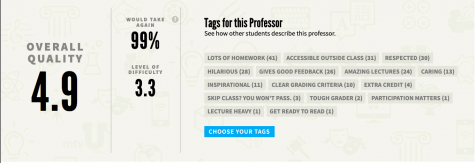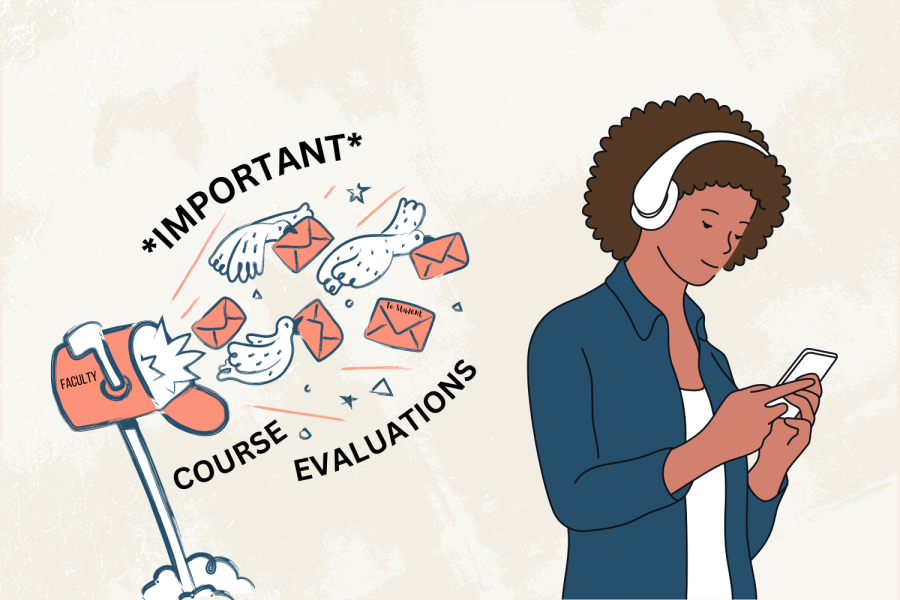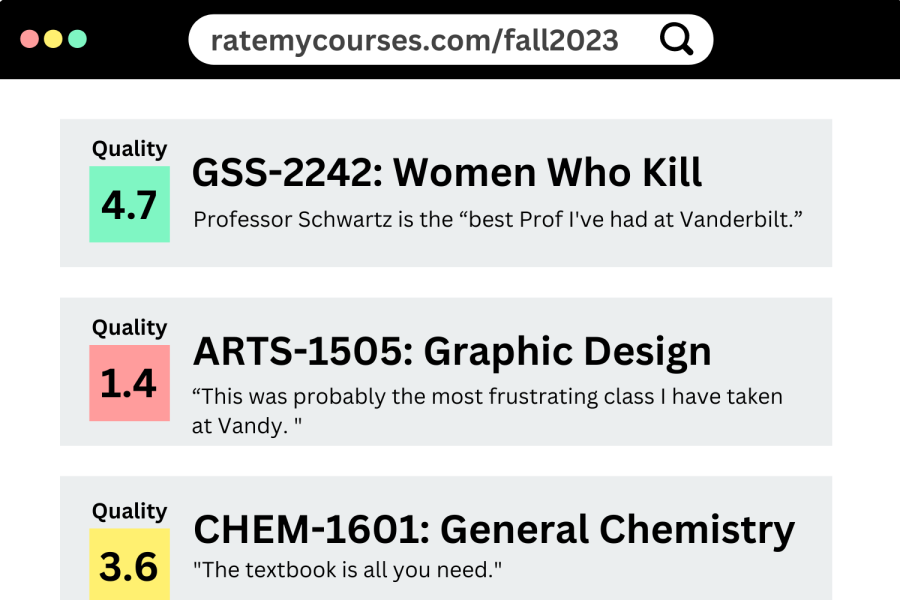With the course registration window for the Spring 2020 semester fast approaching, students are beginning to decide what classes and professors are right for them. Many students turn to third-party professor evaluation platforms like Rate My Professors to make what they feel is an informed decision.
“[Rate My Professors] is beneficial to students because it is more candid and not as forced as Vanderbilt’s existing platform,” senior Sean Kwon said. “You have to be mindful of bias, but I think it’s a really helpful resource. If you don’t know friends or upperclassmen who took a course, you can use it to get a feel for it.”
Rate My Professors states that it is the “largest online destination for professor ratings,” with over four million college students using the platform each month. Users are able to submit anonymous reviews of more than 1.7 million professors across 7,500 schools located in the US, Canada and the United Kingdom. Each professor is scored with an “overall quality” rating out of five, a “level of difficulty” rating out of five and a “would take again” percentage. The website allows reviewers to describe professors using certain tags such as Tough Grader, Get Ready to Read and Amazing Lectures. Students may also be on the lookout for other professor profile tags such as Skip Class? You Won’t Pass, Participation Matters and Graded by Few Things.

The information that Rate My Professors provides is user-generated by students. They create a new professor’s profile before they even begin teaching a course and Rate My Professors can’t fully confirm identities or reviews. To ensure the accuracy of reviews, Rate My Professors requires student reviewers to verify student and course enrollment.
Professors are also able to create accounts to access and personalize their Rate My Professors profiles. However, some professors like astronomy professor David Weintraub disregard using the platform entirely.
“I feel confident, to a very high level of confidence, that a platform like Rate My Professors, like all social media outlets, is a very biased metric for evaluating teaching,” Weintraub, who has a 3.9/5.0 Rate My Professors rating, said in an email to The Hustler. “Typically, only the most disgruntled students will access such a tool and submit an evaluation, just like only the most unhappy visitors to a hotel will bother logging onto the review site and submitting a review.”
At the end of each semester, professors ask their students to complete a course evaluation survey. The survey covers topics ranging from the workload to the instructors’ demonstrated interest in student learning. Archived course evaluation results from before and including Spring 2016 can be accessed through VOICEView (Vanderbilt Online Instructor and Course Evaluations) while evaluation results since Fall 2016 can be found using Course Evaluation View. Course evaluation results can only be accessed with a VUNet ID and password.
Many student course evaluations are unavailable for viewing through VOICEView and Course Evaluation View. Courses are excluded when less than 51 percent of students in a class responded, fewer than five total students responded, the instructor has taught for fewer than three years or a graduate student (TA) was an instructor. Deans may also hide evaluation results at their discretion.
The aforementioned criteria limited availability of course information on the platform. For instance, 82 of 552 classes offered in the English department since Fall 2016 have student evaluation results available for viewing on Course Evaluation View. For astronomy-related classes, only eight of 146 meet the criteria for viewable evaluations.
Even with the limitations of Vanderbilt’s own course evaluation system, faculty members like economics professor Heather Luea – who has a 3.3/5.0 on Rate My Professors – believe that university resources still offer a more reliable and representative service.
“Probably only those who have strong feelings about their professors would be motivated to go on a different platform like Rate My Professors to submit comments and ratings,” Luea said.
For students who will continue to use Rate My Professors to choose their courses and professors, Luea suggests reading into the details of the comments to determine whether or not the reviews are relevant and important to them.
Several years ago, a Google Chrome extension called Rate My Vandy Professors rose to prominence. This plug-in enabled users to display a professor’s Rate My Professors rating next to their name when viewing courses on YES. Rate My Vandy Professors was last updated in April 2016, and students now encounter issues using it.
“I would like to see a return of the extension,” sophomore Hermela Gebremariam said. “I think Rate My Professors is beneficial in that you get a sense of what the professor and course is like. However, I also think it can stop people from taking a class just because of a professor’s rating. I typically use Rate My Professors over Vanderbilt’s own platform.”
Other students like first-year Sterling Gourdine aren’t as convinced that an updated version of Rate My Vandy Professors would improve the course registration process.
“I feel like if you have a Vandy extension for Rate My Professors, it would be super easy for people to just judge what classes to take based on a subjective rating rather than their interest in the course or subject,” Gourdine said.









